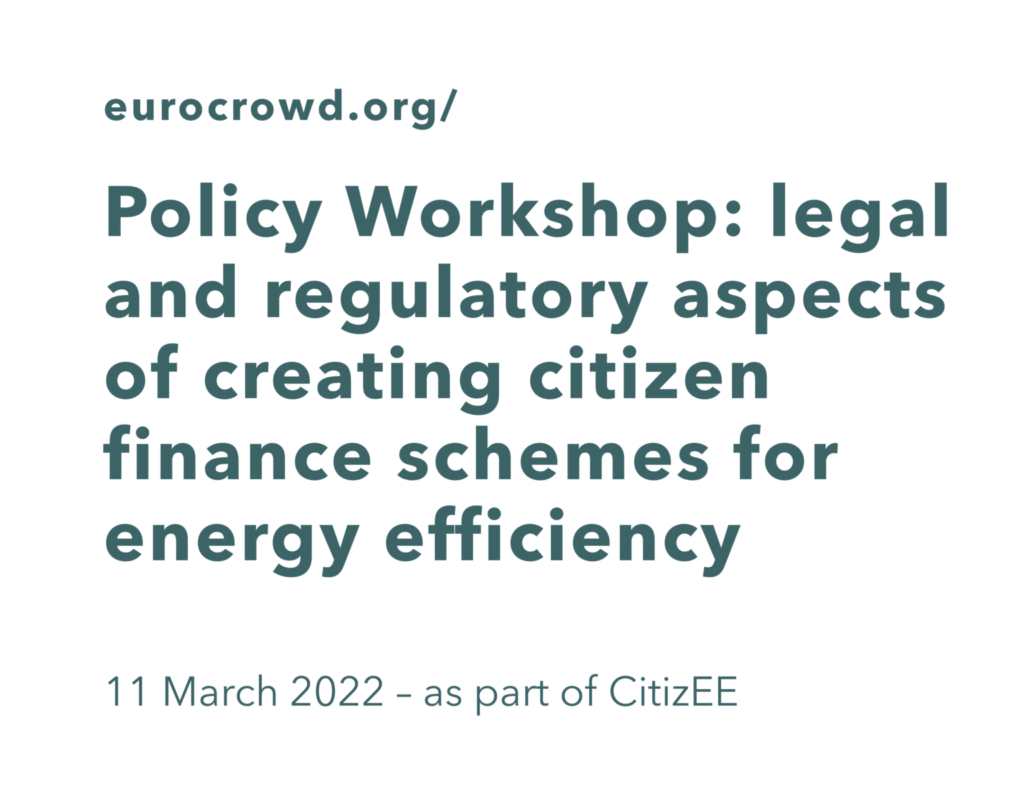Legal & regulatory investment framework analysis
Citizen Financing Crowdfunding energy effciency Investment Platforms - 05 February 2020
This report is a compilation of the initial situation, the planned activities as well as the opportunities and difficulties of CitizEE’s four pilot regions Portugal (GOPARITY), Belgium (VEB), Croatia (REGEA) and Lithuania (VIPA). The result is a comparing overview of the current state from a legal point of view. In order to achieve a detailed view on the cases the report was written in close cooperation with the partner countries as well as with ECN and ENERGINVEST. With the help of a questionnaire, follow-up questions and discussions it was possible to not only finalise a legal and regulatory analysis but to also get an impression what other relevant aspects for the pilot regions do exist.

The barriers that exist in the four pilot regions can be separated into two main categories: The energy related and the investment related barriers.
Energy related barriers that were identified are:
- The rules for public procurement of energy efficiency (EE) projects, in particular because those rules foresee mandatory tendering and may hinder the development of specific selection and awarding criteria,
- Lack of development and completion of national legislation, e.g. the Energy Strategy of the Republic of Croatia is still not finalised and the amendment for the Law on Energy from Renewable Sources in Lithuania, where primary general principles and operating conditions for energy communities are introduced, is not yet in force,
- The energy price and the energy of self-consumption for prosumers is too low so new business models are not stimulated.
Investment related barriers that were identified are:
- Several Investment limitations, both, for individuals that want to become investors as well as for the upscaling of campaigns,
- The Eurostat Regulation on ESA neutrality, which may be a problematic aspect when it comes to a very high level of ambition in Energy Performance Contracts,
- The law on Energy performance contracting (EPC) leads to problems, e.g. in Belgium EPC is seen as financial lease, which is prohibited,
- There is a lack of business cases for in depth renovations (with payback times that are 30 years or higher),
- Lack of development of the Law on Consumer Financing and the creation of a basic legal framework that facilitates crowdfunding models,
- High bank and card processing transaction fees and the high price of the loans in some pilot regions.
- Development of an investment platform according to European Union law will be challenging/problematic for some regions.
However, a barrier analysis, as important as it is, is not likely to draw the whole picture of the legal and regulatory point of view. For the development of investment platforms in the pilot regions and the success of CitizEE it is also crucial to look at the opportunities that exist but may not have been considered to this point. It is therefore necessary to give an overview of the relevant legal framework on European level to get an impression where there might be aspects that are worth to be analysed even closer. At this stage of development of the pilot cases a certain flexibility is present, which can be used to make steps in the most promising direction.
The most important aspects of the relevant European legal framework are:
- The Clean Energy Package, i.e. Energy Efficiency Directive, Energy Performance in Buildings Directive, provisions for energy communities and for individual or collective self-consumption,
- The Crowdfunding Service Providers Regulation,
- The upcoming InvestEU Programme.
Another aspect that has to be kept in mind while reading the following report is the existence of the two levels of legislation. There is the European and the national/regional level, which both interfere with each other through a dynamic interdependency.1 That means, on the one hand, the national legislation can be seen as the initial point for each of the pilot regions, as this legislation is the more concrete and more specific set of rules that has to be considered while developing the investment platform. On the other hand, the European legislation affects the national legislation as it is on a superior level and therefore national legislation must not contradict European legislation. But then again, the European legislation (as long as it is not a Regulation, which is directly applicable in all Member States) has to be implemented by the Member States and therefore transformed into national law. Here, a certain discretion exists and each Member State is allowed to create its own legislation as long as it is in line with the European set of rules. The implementation is likely to follow the already existing national legislation as far as it is allowed by European legislation. Thus, if there are changes in one level it is most likely that the other level will change as well, which then again may affect the other level.
Download the report here



